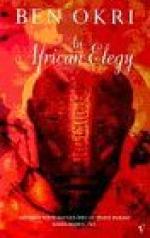|
This section contains 493 words (approx. 2 pages at 400 words per page) |

|
Death
"An African Elegy" presents death as a subconscious force that is not fully present to the speaker except in symbolic terms. Duncan charts his relation to death through introspection, likening his own mind to Africa's jungles. His descriptions of those jungles are replete with images of suffering and death: "Death is the dog-headed man zebra striped /and surrounded by silence who walks like a lion, / who is black." For Duncan, Death is both an ominous seducer, who beckons Virginia Woolf to "come back" to the river to complete her suicide, and a welcome presence, who can rescue people from torment: in death "all our tortures [are] absolved in the fog, / dispersed in Death's forests, forgotten." The death drive, popularized in the philosophical idea of Thanatos, is alternately welcomed and rebuffed in Duncan's poem. As an elegy, this poem mourns not physical death, per se, but the fact that...
|
This section contains 493 words (approx. 2 pages at 400 words per page) |

|




